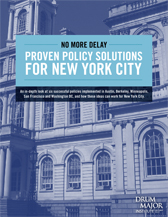John Petro
The Right Policy Solutions for New York City

In less than four months, New York City voters will decide if Mayor Bloomberg deserves a third term in office or if one of his challengers, William Thompson or Tony Avella, should take the helm. In addition, voters will be electing nearly fifty other city officials, from members of the City Council to City Comptroller and Public Advocate. This is a critical election. New York City needs elected officials that will promote the best solutions for the problems that New Yorkers face every day.
It turns out that New York City could learn a lot from other cities across the country. In a new report from DMI, No More Delay: Proven Policy Solutions for New York City, we examine six areas of policy in which New York City has failed to address significant challenges faced by New Yorkers: economic opportunity, housing affordability, criminal justice, workplace standards, environmental sustainability, and health care. In each issue area the report highlights policy solutions from other cities that have proven records of success.
Workplace standards: Nearly one million working New Yorkers do not receive any paid sick days, contributing to negative health outcomes, the spread of contagious disease, and lower worker productivity. However, San Francisco guarantees all workers paid sick days to care for themselves or a sick loved one. The policy is not only a meaningful benefit for workers, but also aims to increase employee productivity and reduce the spread of contagious disease. In addition, members of the business community in San Francisco agree that the policy has not been a problem, despite their initial opposition.
Economic Opportunity: New York City gives out millions of dollars a year in tax breaks to private companies that may not need subsidies and that go on to create poverty-level jobs--or few jobs at all. But in Minneapolis, subsidy recipients are required to create living wage jobs. If the jobs are not created, the subsidy must be paid back with penalty. The policy ensures that the public receives significant benefits when tax dollars are invested in a business subsidy deal.
Criminal Justice: New Yorkers falsely confess to crimes they did not commit, harming public safety and damaging the integrity of the criminal justice system. Washington, DC requires that all interrogations be videotaped in their entirety. This policy creates a permanent record of interrogations, makes police officers less vulnerable to allegations of abuse, and prevents the miscarriage of justice.
Housing Affordability: New luxury housing has pushed up housing prices in the city, resulting in displacement of long-time residents. San Francisco is taking steps to increase the production of affordable housing by requiring developers to build affordable units when constructing new market-rate housing developments. This policy not only preserves economically integrated neighborhoods, but also provides neighborhood benefits.
Health Care: Over one million New Yorkers do not have health insurance or access to basic health services. Meanwhile, San Francisco has expanded health care coverage to 60,000 residents that did not have health care though a program that provides health services to the uninsured.
Environmental Sustainability: Three quarters of New York City's greenhouse gas emissions are from heating, cooling, and powering our buildings. Berkeley, CA is providing low-cost financing to property owners that wish to install renewable energy systems or make energy efficiency improvements. This policy not only defrays the high upfront cost for property owners, but has almost zero impact on the city's budget.
John Petro: Author Bio | Other Posts
Posted at 7:29 AM, Jul 15, 2009 in
Urban Affairs
Permalink | Email to Friend










